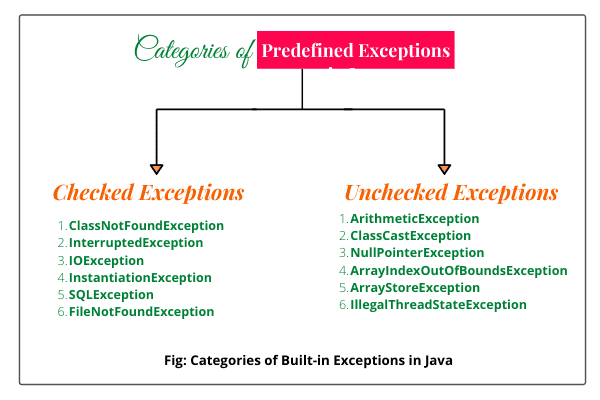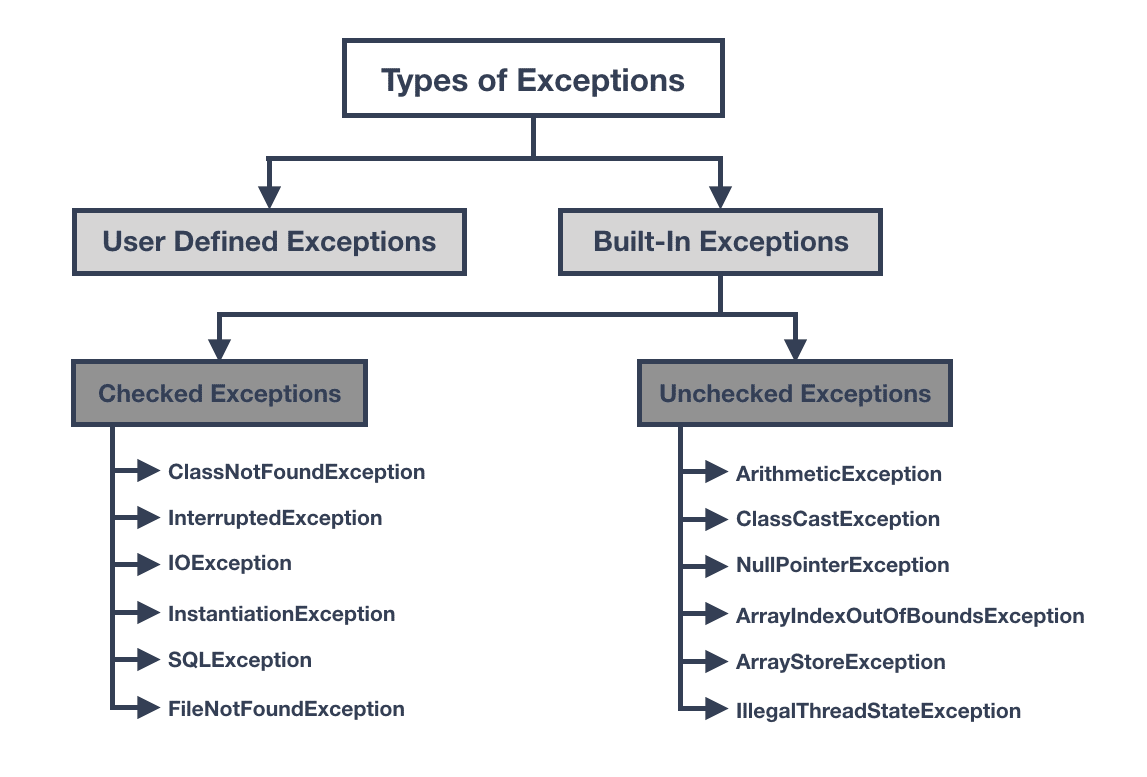Unchecked Exceptions Are Those That Inherit From
The Error class or the RuntimeException class. Unchecked exceptions are those that inherit from.

Checked And Unchecked Exceptions In Java Scientech Easy
Only the Error class.

. Before going into checked exception Vs unchecked exception lets try to understand which exception classifies as a checked exception and which one as unchecked. Unlike the checked exceptions the compiler generally ignores the unchecked exceptions during compilation. All classes that inherit from class Exception but not RuntimeException are considered to be checked exceptions.
Checked exception and unchecked exception. Both of these shortcuts allow programmers to. The Error class or the Exception class.
The main difference between checked and unchecked exception is that the checked exceptions are checked at compile-time while unchecked exceptions are checked at runtime. The best answer that I have read is that these exceptions are mostly caused by programmers writing incorrect code. Errors should identify programmatically unrecoverable problems eg.
What is an Unchecked Exception. Unchecked exceptions are those that inherit from. The Exception Class or the RuntimeException class.
Because the Java programming language does not require methods to catch or to specify unchecked exceptions RuntimeException Error and their subclasses programmers may be tempted to write code that throws only unchecked exceptions or to make all their exception subclasses inherit from RuntimeException. Checked exceptions are those exceptions that are of type Exception class Exception and its subtypes except RuntimeException and its subclasses. View the full answer.
A the Error class or the RuntimeException class B the Error class or the Exception class C the Exception Class or the RuntimeException class D only the Error class. In other words classes Error or RuntimeException or those that inherit. Question 6 This is a section of code that gracefully responds to exceptions when they are thrown.
An exception is an unwanted or unexpected event which occurs during the execution of a program ie at run time that disrupts the normal flow of the programs instructions. The Error class or the RuntimeException class. Unchecked exceptions are those that can be thrown without notice they are not specified in a method signature.
Catch clause is used to handle the exceptions that are thrown by try clause. In Java the direct parent class of Unchecked Exception RuntimeException. If exceptioncheckedunchecked is thrown in the parent classs method then child classs overridden method is not forced to through an exception.
Well-known examples of unchecked exceptions are ArrayIndexOutOfBoundsException IllegalArgumentException or NullPointerException. However it can through the exception if it wantsrules will apply. The first catch clause that can handle the exception d.
Assume that the classes BlankISBN NegativePrice and NegativeNumberOrdered are exception classes that inherit from Exception. The Exception Class or the RuntimeException class. On the other hand checked exceptions are caused by external conditions beyond the control of the programmer.
In Java there are two types of exceptions. Exceptions should identify programmatically recoverable problems which are caused by unexpected conditions outside control of code eg. Child is throwing any checked exception but parent is not throwing any exception.
Whereas finally clause u. Unchecked exceptions are checked during the runtime. For example the IndexOutOfBoundExceptionis an unchecked exception.
The throws clause causes an exception to be thrown. Each catch clause that can handle the exception c. These are the exceptions that are not checked at a compiled time by the compiler.
Errors class Exceptions like StackOverflow OutOfMemoryError exception etc are difficult to handle. The Error class or the Exception class. In this guide we will discuss them.
In this post well see some of the differences between checked and unchecked exceptions in Java. Unchecked exceptions are those that inherit from a. A catch clause in its header.
The following code is a constructor for the Book class. When an exception is thrown by code in its try block the JVM begins searching the try statement for a catch clause that can handle it and passes control of the program to _____. Because the Java programming language does not require methods to catch or to specify unchecked exceptions RuntimeException Error and their subclasses programmers may be tempted to write code that throws only unchecked exceptions or to make all their exception subclasses inherit from RuntimeException.
Unchecked exceptions are those that inherit from. There are two types of exceptions. Unchecked exceptions are those that are either Error or RuntimeException.
Only the Error class. These are the exceptions. These exceptions inherit from RuntimeException which has the effect.
This answer is not useful. Show activity on this post. If a method does not handle a possible checked exception what must the method have.
Child class throwing checked exception. Unchecked Exceptions The Controversy. In Java exceptions under Error and Runtime Exception classes are unchecked exceptions This Exception occurs due to bad programming.
The last catch clause that can handle the exception b. Try cause catch clause finally clause throws clause Question 7 Unchecked exceptions are. These exceptions occurs because of bad programmingUnchecked exceptions are purely programmatic errors wrong calculation null data or even failures in business logic can lead to runtime exceptions.
RuntimeExceptions should identify programmatically. Therefore the compiler does not check whether the user program contains the code to handle them or not.

Unchecked Exception Programming Pearls

How To Handle Checked Unchecked Exceptions In Java Rollbar

How To Identify Checked And Unchecked Exceptions In Java Stack Overflow
Comments
Post a Comment